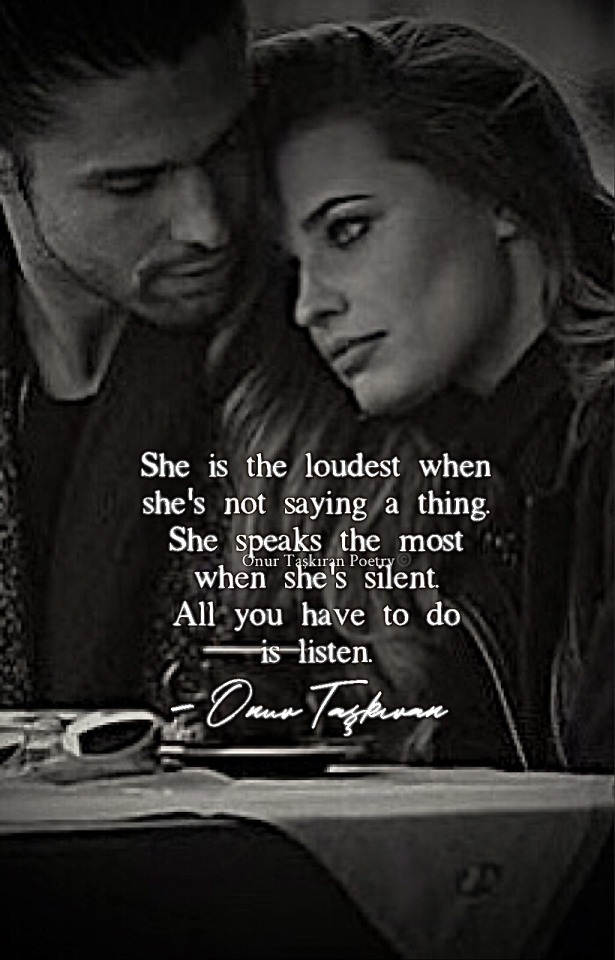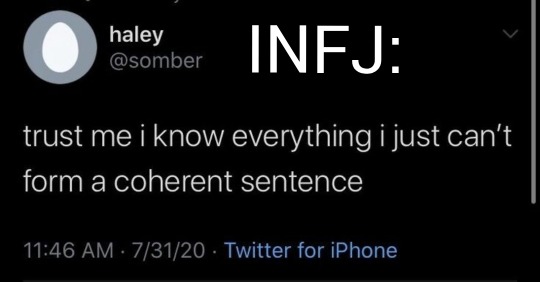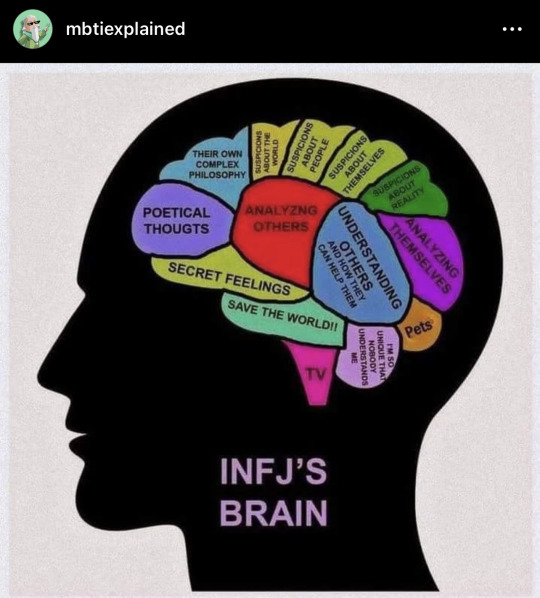#understanding infj
Text
The (basic) thoughts of INFJ
The needs and emotions of others are more important than my own.
I need to avoid conflict, even if I lose out. But when everyone else is happy, I am too.
I love the whole world and don't get that love back, that's why I'm bitter deep inside.
I realise and notice more things than others but can't put them into words
People say I'm an extrovert, but I'm just not shy, I still like being by myself more than being with people and will avoid people if possible.
I feel lonely but are afraid of deep emotional bonds, because emotional stress is heavy for me.
I can handle my life but would wish for someone to help and love me, but also kinda know no one will meet my standards or love me like I need it
I am smart but only because I recognise patterns fast and remember interesting things, I am not exactly an expert in anything
People say I am childish when I'm happy, dramatic when I'm sad or afraid and bitter when I'm angry. It's probably best to not show them too much
I trust only a few people so much I consider them my friends. I'm overly loyal and when a friend leaves, I often don't understand. People seem to often leave me despite me trying my best to do everything for them.
#infj#understanding infj#infj struggles#infj feelings#infjlife#infj aesthetic#mbti things#mbti thoughts#intj#infp#enfp#entj#enfj#estp#estj#esfj#esfp#intp#myers briggs#mbti#mbti intj#mbti infp#mbti memes#infj stuff
906 notes
·
View notes
Text

She speaks the loudest when she’s quiet. Listen to her silence.
This is a caption from a piece I did last year.
#poets on tumblr#love quotes#love poetry#romantic poetry#love poem#onurtaskiran poetry#romantic writer#gentleman poet#poets and writers#love#listen to her silence#silence speaks#silence is loud#listen to understand#communication#understanding#empath#infj#infj empath#empath’s love
107 notes
·
View notes
Text
Anon wrote: Hi MBTI-notes. INFJ here. Many thanks for your tremendous insights. Your analysis of unhealthy INFJ’s has been absolutely spot on for me. I can see that I can be incredibly, sometimes laughably, unrealistic, have great difficulty being present, and alternate between too cynical and too trusting.
However, despite knowing about the INFJ weaknesses for several years now thanks to your blog, I keep making these mistakes. Some feel harder to change than others - like the difficulty focusing that, in my case, seems similar to ADHD.
I am trying a variety of things including finding the right mentors to bring me back to reality and hold me accountable, DBT, and improvements to basic physical self-care like sleep. I might also consider getting on medications for bipolar I (a diagnosis I have received due to two manic episodes, although they’re not sure if I need to be on meds) or ADHD.
In your experience, what is necessary to successfully close the gap between simply knowing about my problematic patterns and actually changing them? I am really hoping that improvements in emotional intelligence via DBT will close the gap, and also am trying to be more systematic about maintaining and improving my interpersonal relationships. Maybe it will be a combination of many small things like mastering physical health and routines, realistic goals, the right mentors, discipline, etc.
(From the INFJ who mentioned bipolar I). As an addendum, I just wanted to mention that the two episodes definitely involved some psychotic thoughts and behavior, but it's unclear if they fit a traditional manic episode, as I've not experienced periods of little sleep but high energy. It’s quite possible that BPD is a better explanation due to a connection in both cases with a romantic interest. I just wanted to mention this in case it impacted your response at all.
----------------------
"Knowing" about problems means being in possession of the facts, so it comes mainly through observation and gathering information. A lot of people go through life not knowing how problematic their thinking/behavior really is until they get critical feedback or generate very negative consequences. Even then, perhaps they still can't admit to having a problem and they use defense mechanisms such as denial to avoid confronting the truth. Getting through these defenses can be an arduous process. Even though knowing is really only the first step, it can already be quite a difficult step.
If knowing is only the first step, it means it's not enough. More is required. Knowing is not the same as "understanding". Understanding comes mainly through developing self-awareness, which involves the capacity to perceive and evaluate oneself accurately and objectively. Self-awareness can be described as low/high or shallow/deep. To improve self-awareness usually involves going inward, through reflection and introspection, to discover the roots and mechanisms behind psychological issues.
If knowing is about grasping the facts, understanding is about being able to provide a proper explanation of the facts. For example, a lot of people feel low self-confidence very acutely but they have no idea about how it came to pass or why they suffer. When you don't understand your thinking/behavior, it means you don't know the causes of it, the motivations behind it, or the factors that contributed to its manifestation.
That said, when people know but don't understand their problem, they are still capable of some small self-improvement. Generally speaking, they'll seek out advice from those in the know and try to discover some common rules, methods, or procedures for dealing with the problem, which allows them to become more functional in daily life. However, while they can improve a bit, their growth tends to be limited because it remains unclear whether the solution they've found is the correct one. Perhaps they feel some relief or progress, but it doesn't really seem long-lasting. Why? Knowing without understanding means every "fix" you try is basically blind and random experimentation. If something works for awhile, you don't understand why. If something doesn't work, you don't understand what went wrong. This is one reason why self-help methods have a high rate of failure; they simply don't get deep enough into the problem, so self-awareness remains too low.
Using the example of low self-confidence to illustrate, different people suffer for different reasons. For Person A, perhaps it's because of fear of failure that creates too much anxiety to feel confident. For Person B, perhaps it's because they lack knowledge and skill, so they feel too incompetent to approach tasks confidently. Person B needs to improve their knowledge and skill through learning and practice in order to feel more confident. But this remedy isn't going to work for Person A. Regardless of how knowledgeable or skilled Person A is, they will continue to fear failure, because it is an entirely separate issue that remains unaddressed by Person B's remedy. If you were looking to the above two cases for inspiration, you wouldn't get very far without knowing YOUR individual reasons for suffering low self-confidence.
It sounds like you are still in the stage of knowing - gathering the facts about your issues in order to name/label them correctly. It's good you've gotten some practical advice for managing your issues. Using the INFJ functional stack to frame the issues also seems to have been helpful for improving your self-awareness. However, what I'm still not seeing is true understanding. You haven't yet discovered the underlying causes/mechanisms and aren't able to provide an accurate and objective explanation of why you suffer from these issues. In short, it's just harder to solve a problem when you don't know the cause or how it arose.
This is probably one reason why you're running into difficulty with getting clear official diagnoses. People often view an official diagnosis as "the answer", but oftentimes the label is just a way to describe a particular set of symptoms. It doesn't reveal enough about what's really going on underneath the surface. The process of talk therapy ought to be aimed at making better sense of the symptoms, so it's important to pair any pharmaceutical interventions with talk therapy.
I never want to discourage people from self-improvement. I appreciate your willingness to seek out answers. You asked me what might be lacking in your approach and I've given you my best guess. You've focused a lot on "doing" and "following", implementing some commonsense strategies like physical self-care and learning from good mentors. This is certainly a step in the right direction. But from the perspective of analytical psychology, you haven't done enough to go within to understand your own individual psyche. It is likely that working on your emotional intelligence through DBT will deepen your self-awareness. But, at this early stage, there is no way for me to predict if it will "close the gap". If you care about understanding yourself better, be willing to take your therapist's reflections and inquiries as deep as you can go with them.
#infj#knowing#understanding#development#growth#mental health#self awareness#self help#therapy#psychology#ask
20 notes
·
View notes
Text
when i was young i used to think about if everyone else in the world disappeared overnight, and how nice it would be, because for me, it meant total freedom. i would never have to follow rules for anyone again, i would never have to perform for anyone again, i would never disappoint anyone's expectations of me ever again
#of course that was just a fantasy and today for better or for worse i am a very strong proponent of having a set of rules and norms#-to follow to ensure the smooth working of society which means that i think people should be able to understand and play by those rules#rules that are fair and equitable#even if it means making personal sacrifices#but... i think that's why i wanted everyone else to disappear#i dont think i can exist in a way that doesn't compromise myself as long as even a single other person exists that i am aware of#though im an introvert i am a social creature to a fault.. i meet people in the middle.. im an aggregate of people i know but not *me*#and i think i really hate that about myself.#yap#moodboard#^ INFJ villain monologue#like id slay as a villain i think. i have the fucked up ideals
7 notes
·
View notes
Text

80 notes
·
View notes
Text
When you feel like no one understands you, but at the same time you understand so many people to the core of their soul - and your values clash with just about everything else on earth - the outlook can appear pretty grim.
#lauren sapala#loneliness#lonely#isolated#struggling#no one understands#only you#frustrated#keep going#don't give up#don't be afraid#you are strong#you can do it#you have the power#keep searching#you are not alone#believe in yourself#infj#introvert#beyond your age#beyond your awareness#rest if you must#you will find what you're looking for#believe#you are gonna make it#you're stronger than you think#limited beliefs
16 notes
·
View notes
Text
Finally watching the interview with WooSan and the mbti talk is killing me. How the hell did Woo get ISTJ and San INTJ...dawg what 😭
#i need 16personalities to shut down#begging for idols to learn a bit about cognitive functions 😭🙏#san's is a little understandable since isfp and intj share the same functions. just different order#but he's such an fi dom...no way hes an intj. im an intj. i would know 💀💀#woo ??? def not an si dom. fi-te yes he uses those but si-ne absolutely not 😭#the only istj is maybe jongho (xstj) and the closest to intj is hongjoong (infj)#yes im starting the new yr by complaining abt mbti lmao this is a sign for me to work on my drafts/posts#ateez#ateez mbti
3 notes
·
View notes
Text
when Taylor said in lpss “everybody has to be duplicitous,” and went on to give all those piercing comments about said thought, oh booooooy did I feel that
#did she peer into my soul and grab that single thread of coherent thought that has kept me afloat all these years and take it and run?#does she one thousand percent understand just how valid of a statement that is and for how it resonated within my very bones?#SHE MUST’VE#because my word I know that’s how I live#the handful of people that actually know all that I am is minuscule#I guess that’s the curse of being an#infj#long pond studio sessions#mine
4 notes
·
View notes
Text
Unexpressed emotions will never die. They are buried alive, and will come forth later, in uglier ways.
—SIGMUND FREUD

#aesthetic#dark academia#quotes#love#books & libraries#infj#feelings#express#understanding#emotions#dark#darkness#mental illness#stress#depressed#depression
4 notes
·
View notes
Text

#infj#understanding infj#infj struggles#infj feelings#infjlife#infjmemes#mbti things#mbti#mbti memes#mbti thoughts#mbti infj#memes#mbti meme#meme mbti
427 notes
·
View notes
Text

It may simply be a passing storm. Your first reaction is to run for an umbrella to protect her from her own tempest. But don't. She simply wants you to be with her to ride out her storm. Go on, get soaked, let it thunder. Sit with her until her rainbows come out.
#poets on tumblr#love quotes#love poetry#romantic poetry#love poem#onurtaskiran poetry#romantic writer#gentleman poet#poets and writers#love#storm#rain clouds#understanding#depression#mental wellness#sit with her#empath’s love#infj gentleman#infj poet
109 notes
·
View notes
Text
So today, I was upset that Wendy from Peter Pan wasn’t listed as an INFJ on a Myers-Briggs app, so I took the Myers-Briggs quiz, putting in what I thought was true of her.
She got INFJ.
I will be riding on this high for a solid week. That is all you really need to know about me.
#I told my parents#they did not care#I’m INFJ too which is why I felt so strongly about it#but I selected several answers that were different than what I’d put for myself#I feel very edified#yes I understand it’s subjective and open to interpretation#I’m still very pleased#Wendy Darling#infj
2 notes
·
View notes
Text

#infj#so seriously#look at all that suspicion#on top of being able to understand people its usually right#pets are a bigger spot tho.
4 notes
·
View notes
Text
WHY DO INFJ FEEL STRESSED UNDER SUPERVIVION?
Working with or employing an INFJ comes with a bottle of thanks, most of the times they are just smart and seem to be what you wanted or you were looking for, they will perform all tasks with great efficiency, but soon or later, you will notice some unsettledness with the INFJ when you supervise their work, and if you are an INFJ, you have sometimes felt so uncomfortable under supervision and a…

View On WordPress
1 note
·
View note
Text

18 notes
·
View notes
